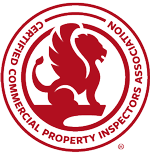Commercial Property Inspection Format:
How to Draft a Commercial Property Inspection Proposal
The client may have limited experience with commercial property inspections and building systems and components, so it important for the inspector to explain their services in non-technical terms. It may be the client’s first time ordering a commercial property inspection.
NOTE: Using non-technical terms does not mean using non-specific language. Commercial property inspectors shouldn’t use overly complicated language, but they should use exact terms.
The following list includes elements that a written proposal may include. Most of the information is gathered from the Commercial Property Inspection Call Sheet. It can also be compiled from the preliminary research on the subject property.
- Introduction: The introduction is an excellent way to introduce yourself, your firm, and your team. It should be as brief as possible. It is also the first opportunity for you to make an impression in writing. This is often boilerplate text. Create a compelling story and reason for your client to spend their money to hire you.
- Property Address & Building Description: Describe the type of building. Include the size of the building in square footage. Break out the different spaces, such as office and warehouse, finished or unfinished, and any other distinguishing features to help accurately describe the building, including specific building components and systems. Include the known structural characteristics, such as masonry, frame, steel, stucco, etc.
- Standards of Practice: This is where inspectors should prominently state that the inspection is performed in accordance with the ComSOP. Since it is of particular interest to clients, the inspector may choose to include a copy of the ComSOP or the most relevant portions, such as the procedure (research, walk-through survey, written report), the items to be inspected and not inspected, and the limitations and exclusions of the inspection.
- Scope of Work: The scope of work is the work that deviates from the ComSOP. The work might include:
a. an ancillary service;
b. additional inspection items (excluded from the ComSOP);
c. excluded inspection items (excluded from the ComSOP);
d. reassignment of research responsibilities; and/or
e. an inspection focal point. This could be a specific building system or component. - Fees & Retainers: The commercial property inspection fee should account for the work listed in the ComSOP section and Scope of Work section. For larger projects, it is customary to receive a retainer when the job is scheduled. This enables the lead inspector to pay his team members at the time of their service, instead of when the entire inspection is completed. In some cases, payment for the commercial property inspection may take several weeks, especially for large projects. Every inspection firm should have a different threshold for when to use the retainer payment method.
- Establish Your Delivery Timeframe & Method: Let the client know when the report will be delivered to them. Generally, it is a timeframe, rather than an exact date. At this point, the inspector should know exactly how long it will take them to thoroughly inspect the property and create the report, along with how long it will take for the consultants’ reports to be completed, and the efforts necessary to fulfill all of the processes agreed to in the proposal. Therefore, you can be fairly certain when the report will be ready. The inspector should also communicate the method by which the final report will be delivered.
- Create an Expiration Date: Unlike residential real estate transactions that typically have a brief window for the inspection to be completed, the window for a commercial inspection may be as long as six months. Given that this timeframe may be longer, you should impose an expiration date. This allows the proposal to include some flexibility. The inspection fee could even fluctuate seasonally. The inspector does not have to be locked into a set price for the whole six months. As long as it’s reasonable, the client should be understanding. Most inspectors consider a 30-day time limit to be typical.
- Acceptance: The client’s acceptance is the final piece of the proposal. Key aspects for review can be noted, including fees, services, contacts, retainers, and scheduled dates. There should be a signature line for the client to indicate their acceptance.
Optional: Ancillary Services & Fees. Based on your experience and knowledge of the property, as a commercial property inspector, you may choose to recommend an additional service that would best fit the needs of the client’s specific project. However, this may not be necessary for every project.
If recommending ancillary services, a narrative should pose a potential problem/risk specific to the property type, a change in use, the property’s location, and then the ancillary service as the solution. Generally, this is good practice for customer service. Sometimes, the inspector may not be able to do this without further research or a site visit.
Additional services could include traditional environmental tests, such as for mold, radon, asbestos, and lead, and other services, such as inspecting alarms and sprinkler systems, providing cost estimates for repair, replacement, or accessibility, and providing estimated life expectancies for systems and components. These may need to be added to an “Exhibit A” (Scope of Work) in the inspection agreement and/or invoiced separately.
Sample Template: Commercial Property Inspection Proposal
Once the client accepts the proposal, the commercial property inspector should proceed to schedule the appointment and establish access to the property. If not included with the proposal, the inspector may also proceed to send the inspection agreement and Request for Documents and Person(s) with Knowledge form.
The Golden Rule: Unfortunately, the company that comes in second place in winning a job doesn’t see any return from the time invested in drafting a proposal. Thus, be wise and efficient with your time and effort.
Download Sample Template (Word Doc)
Email Template for Sending Winning Proposals
In their communication with clients, inspectors must demonstrate professionalism, organization, and attention to detail. Creating and using templates can help inspectors consistently meet these standards. The best templates for proposal emails will demonstrate that the inspector has listened to the needs of the prospective client expressed during the phone interview. Use the following templates as a baseline for your company. You can customize and personalize each one to cater specifically to your prospective client.
Download Proposal Email Templates


